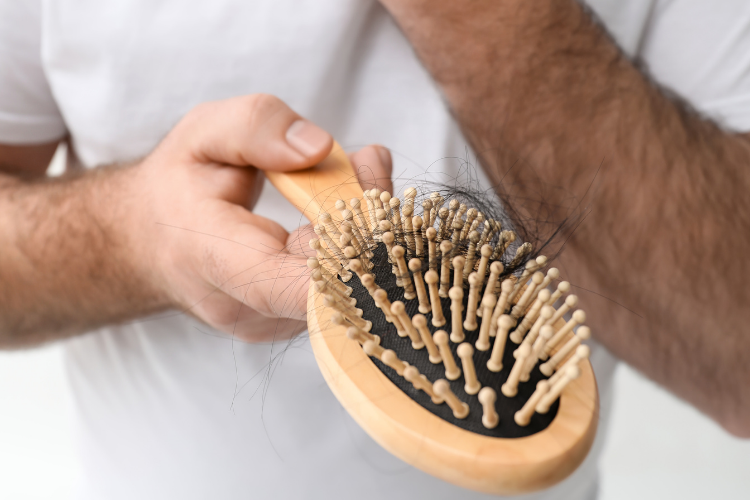
The Link Between Stress and Hair Loss — Folicure Hair Replacement Dallas
Learn about the connection between stress and hair loss, as well as what you can do to prevent and even reverse stress-related hair loss. Folicure Hair Replacement Dallas
Hair loss is a natural part of aging, and the onset of hair loss, as well as the rate at which you lose hair, depends mostly on genetic factors. However, at Folicure, we’ve helped clients of all ages restore their hairlines with personalized, handcrafted hair replacements. While hair loss, hair thinning, and a receding hairline are considered medically normal after the age of thirty-five, today’s fast-paced, the stress-driven world makes excessive and early onset balding much more prevalent, even among young people.
In this article from Folicure Hair Replacement Dallas learn about the connection between stress and hair loss, as well as what you can do to prevent and even reverse stress-related hair loss.
Why Does Stress Cause Hair Loss?
The scientific name for stress-related hair loss is telogen effluvium. In telogen effluvium, stress causes interruptions to the natural growth and shedding cycle of the hair follicle.
On average, the human scalp has approximately 100,000 hair follicles. When you are healthy, the majority of your hair follicles will be in the anagen phase, in which hair is growing from the follicles. The relatively few remaining follicles are in the telogen phase, or the resting phase, in which the hair is shed from the follicle.
Under extreme or chronic stress, a large number of hairs will shift into the telogen phase at one time, leading to sudden shedding that can be enough to cause noticeable hair thinning.
Major stressful events that can cause hair loss in this manner include:
Childbirth
Illness or fever
Surgery
Emotional stress, including grief
Significant weight loss
Can Stress-Related Hair Loss Be Reversed?
Fortunately, according to medical experts from WebMD, most stress-related hair loss is temporary and reversible, if it is a result of stress alone and no other factors (such as other medical conditions or natural aging processes). However, it is worth noting that long-term stress-related hair loss can cause permanent damage to the hair follicles, making the hair loss irreversible.
Here are the recommended strategies for reversing stress-related hair loss:
1. Eat plenty and eat healthily.
Being malnourished or undernourished is a major stressor to your body, even if it might not seem like one from your perspective. Starvation, crash dieting, and malnourishment have been identified as causes of telogen effluvium. When your body doesn’t have as much energy from food as it needs, it prioritizes vital organ and brain functions. Less urgent bodily functions, such as hair growth, reproductive function, and immune system response, are pushed to the backburner during periods of underfeeding. It is therefore essential to ensure that your body is getting the calories and nutrients it needs.
Furthermore, the food you eat should provide your body with the vitamins and minerals it needs to grow healthy hair. Be sure to fill your diet with whole grains, protein, healthy fats such as nuts, seeds, and avocados, and plenty of fruits and vegetables.
2. Take vitamin supplements to aid the growth and repair of your hair follicles.
Nutritional deficiencies can compound stress-related hair loss. It can be difficult to get all of the nutrients you need for healthy hair through diet alone, so you may want to consider taking vitamin supplements to air the regeneration of your hair. Vitamins that your body needs to produce healthy hair include:
Ferritin
Vitamin D
Zinc
Vitamin B12
3. Manage your everyday stressors.
While major stressful life events such as the ones discussed above are known to lead to stress-related hair loss, chronic exposure to everyday stress can have similar effects. How you handle stress, regardless of the scale of that stress, impacts your overall physical health including your hair growth. Find strategies that help you cope with stress. Some that you may consider trying include meditation, journaling, spending time in nature, yoga, breathwork, or talking to a counselor or therapist.
About Folicure Hair
At Folicure, we understand that baldness is more than just skin deep. Whether as a result of a health condition such as thyroid dysfunction or a hormonal abnormality, a side effect of medical treatment such as chemotherapy, or simply a result of aging, hair loss can be anywhere from frustrating to devastating. Folicure Hair is the answer to preserving the hair you still have, stopping hair loss in its early stages or recovering a full head of hair. We deliver results that cannot be achieved with invasive hair transplant surgeries or dangerous chemicals with documented adverse effects. Instead, Folicure will craft a comfortable, undetectable hair replacement system that’s right for you. Schedule your free, no-obligation consultation today.
Sources:
